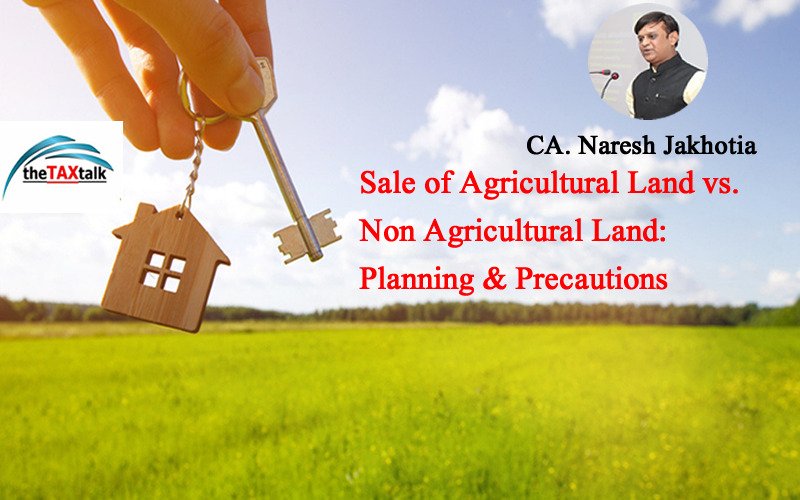![]()
Sale of Agricultural Land vs. Non Agricultural Land: Planning & Precautions
Query 1]
My father has inherited the agricultural land after the death of my grandfather in 1979. The same was received by me in June-2020 after the death of my father as per his will. In the record of 7/12, my name is duly included. We have been carrying out agricultural activities over the said land since 2012. Please guide whether the movement of agricultural land from my father to me is taxable? I want to give part of the land to my brother and sister. For balanced land, I wish to sell the land and invest the proceeds in another agricultural land. Alternatively, I may convert it into Non Agricultural (NA) & thereafter will sell the plots to different persons in a period of around 3 to 5 years. The proceeds would be used for investment in other agricultural land. Please help & guide as to the tax implications on these transactions. Please also guide as to the tax planning measures in these transactions and the precautions / care that should be taken for the above transaction. [rao*****@gmail.com]
Opinion:
-
First of all, agricultural land received by you from your father as a result of inheritance is totally tax free & doesn’t attract any tax liability. After inheritance of the property, you enter into the shoes of original owners & get all the rights and duties bestowed to the original owner.
-
You can upfront gift the portion of the land to your brother/.sister without any tax implication.
-
Sale of Agricultural Land as it is:
The tax implication of profit arising on sale of agricultural land would depend upon whether the agricultural land is a rural agricultural land or urban agricultural land.
Rural Agricultural Land:An agricultural land is considered as rural agricultural land if it is not situated in any area within the distance (measured aerially) of not more than:
a] 2 Kms, from the local limits of any municipality or cantonment board and which has a population of more than 10,000 but not exceeding 1,00,000; or
b] 6 Kms, from the local limits of any municipality or cantonment board and which has a population of more than 1,00,000 but not exceeding 10,00,000; or
c] 8 Kms, from the local limits of any municipality or cantonment board and which has a population of more than 10,00,000.
Urban Agricultural Land:Rural agricultural land is outside the purview of capital assets and hence no tax is payable on sale of rural agricultural land. No similar tax benefit is available to profit arising on sale of urban agricultural land. In your specific case, the land inherited is an ancestral property. Even Though actual cost of acquisition is nil for you, still you can adopt the fair market value of the land as on 01.04.2001 as its cost of acquisition. You would be further able to get the indexation benefit from 2001 even though you became the owner of the property only in the year 2020 after inheritance.
-
Tax Planning on profit arising from sale of Urban Agricultural Land and investment thereof in another Agricultural Land:
If the land sold is an urban agricultural land then the taxpayers can opt for an exemption u/s 54B by investing the amount of capital gain towards purchase of another agricultural land. It may be noted that the capital exemption u/s 54B is not available if the land is sold after converting it to non agricultural. -
Sale of Agricultural Land itself or sale after Conversion into Non-Agricultural Land:
The conversion of agricultural land into N.A. Land fetches a better price and so many taxpayers owning agricultural land in the vicinity of the city have queries similar to the one raised by you. Timely tax planning on such an occasion could be of great benefit for the taxpayer. A stitch in time save nine & tax planning is more effective if done at the initial stage itself. Tax impact may be reviewed & an alternative with lower tax burden can be taken by the taxpayer within the framework of law. In normal course, merely starting off the business by taxpayers does not give rise to a taxable event. It’s at the time of sale/transfer/conversion that the tax liability would emerge.
One of the important aspects that may be considered in such a situation is whether the land should be sold before NA/TP or after NA/TP. The question is of enormous importance in view of the fact that the entire profit on sale of agricultural land would be tax free if (a) it is rural agricultural land & (b) it is used for agricultural purposes.Considering the amount involved, the taxpayer needs to be tax cautious while doing the transactions as mentioned in the query. They should consider the tax implications of all the possibilities in such types of transactions & can arrange the transaction in such a way that the tax liability is kept at minimum. Tax planning aspects cannot be generalized in such a case and it has to be case & individual specific. Few of the factors which should be considered by landowner in such scenario could be:

